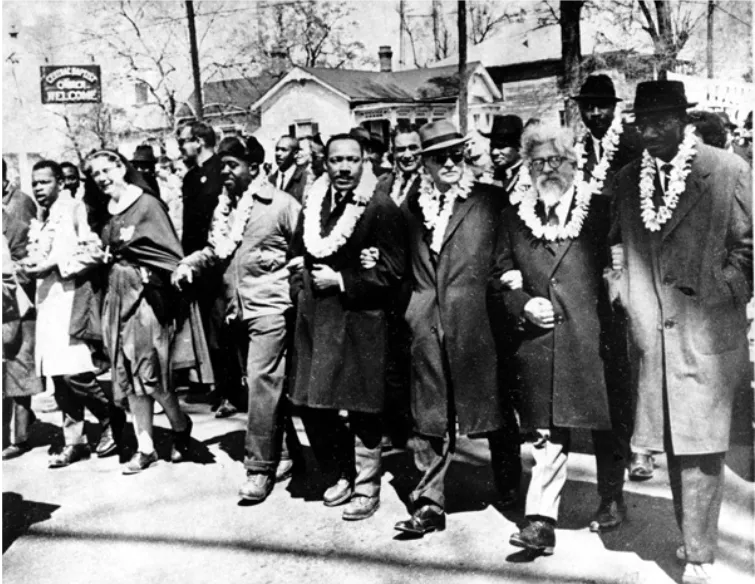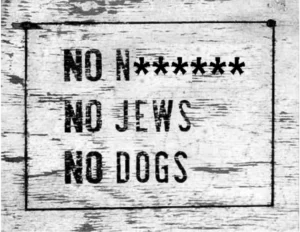20 Tevet 5785 / Monday, January 20, 2025

Rev. Dr. Martin Luther King, Jr.
Rabbi Abraham Joshua Heschel.
The Book of Exodus.
The three go together more often than not.
Heschel and King are forever immortalized in a famous photo (shown above) from Selma, AL in 1965. And on the calendar, the three are frequently together given King’s birthday (15 January), Heschel’s yahrzeit (18 Tevet), and the annual Torah reading cycle which places Exodus’ beginning, typically, in January.
Today, we mark King’s birthday. This past Shabbat, we marked the 53rd yahrzeit of Heschel and we began the Book of Exodus.
King and Heschel had long admired one another from afar for their distinct and overlapping messages and prophetic calls for racial and economic justice in America. They introduced new biblical interpretations to help expand the imagination of a nation torn by race and religion. Both King and Heschel were men of faith, who drew inspiration and purpose from the Book of Exodus and from the prophets of the Hebrew bible.
Though an unlikely pair, these two men had much in common. King was raised in Jim Crow South, and Heschel was a refugee from Nazi Europe. Both men grew to become leaders in lands where their respective people were systematically persecuted. While both were victims of cruelty and hatred, neither man saw himself as a victim. Further, both men felt called by God to stand proud as members of their communities and to bring justice and betterment to their world.
In 1963, Heschel gave a speech in Chicago called “Race and Religion” at a national conference of the same name. He opened his comments with a clever remark, stating that the very first conference on race and religion occurred long before the 20th century. It was none other than the conversation that occurred between Moses and Pharaoh. Rabbi Heschel’s words resonated with much of the audience, including Dr. Martin Luther King, Jr., with whom Heschel would become a friend and ally for the next five years.
In that 1963 speech, Heschel quoted from Exodus, when Moses declared to Pharoah: “Thus says Adonai, the God of Israel: Let My people go that they may celebrate a festival for Me in the wilderness.” Pharaoh responded, “Who is Adonai that I should heed this voice and let Israel go? I do not know Adonai, nor will I let Israel go” (Exodus 5:1-2).
Rabbi Heschel said that the conference between Moses and Pharaoh remains unresolved. Heschel was using the story of the Exodus to make the point that slavery and oppression still exist. Moses’ message to Pharaoh was as relevant in Egypt as it was in America. “The exodus began, but is far from being completed. In fact, it was easier for the children of Israel to cross the Red Sea than for a (Black person) to cross certain university campuses. Let us dodge no issues. Let us yield no inch to bigotry, let us make no compromise with callousness.” Then Heschel referred to the words of another prominent abolitionist, William Lloyd Garrison (1805-1879), who said “I will be as harsh as truth, and as uncompromising as justice. On this subject [slavery] I do not wish to think, to speak, or to write with moderation. I am in earnest – I will not equivocate — I will not excuse – I will not retreat a single inch – and I will be heard.”
Heschel’s choice of words clearly resonated with King. He showed himself to be King’s partner, and their friendship began. Indeed, Heschel was set to host King for a Passover Seder in April of 1968. Needless to say, given King’s tragic assassination, what was an invitation to celebrate redemption turned into a time of national mourning for the beloved leader who worked to create a “beloved community.”
Reframing the picture
Over the years, I have written and taught about the Civil Rights Movement and about the Jewish role in supporting the Black community. Many times my subject has been the rabbis who traveled to Selma to join Dr. Martin Luther King and his followers in the epic march from Selma to Montgomery. I want to honor the legacy of those rabbis and their commitments to social justice. And I am proud of King and Heschel’s partnership.
Today I am writing this column because I feel that to only hold up King and Heschel is to have a limited understanding of our communities’ relationship. And this moment in history demands a more nuanced understanding of our communities’ complex relationship.
The iconic picture of Heschel and King represents one important moment between the Black and Jewish communities. I love that partnership. But at this moment in history that story alone is insufficient.
There are leaders in the Black community who actively seek to demonize Jews and Israel and give no legitimacy for the State of Israel. Since October 7, few of those leaders have publicly held Hamas — and other Iranian proxies — accountable for their terrorism. Most strikingly, Ta-Nehisi Coates’ new essay collection The Message is a painful example of a leading Black voice with a substantial platform who has chosen to spread lies and misleading messages. Ta-Nehisi Coates, presents a false version of reality in which Palestinians are victims and Israel is the aggressor, failing to mention the history of terrorism carried out by anti-Israel Palestinian terror groups, most notably during the First and Second Intifadas. Additionally, Coates bases his entire book on a ten-day trip to Israel during which he met with virtually no Israeli Jews. He makes no mention of past offers of peace by Israel and consistent rejection by the Palestinian leadership. But most problematic of all is that Coates oversimplifies complex issues surrounding the Israeli-Palestinian conflict, only seeing it through the lens of his own perspective as a Black American and likening Israel’s treatment of Palestinians today as analogous to the injustices suffered by African Americans in the United States such as under Jim Crow laws.
This very issue touches us locally, where we have had to confront Bishop Talbert W. Swan, president of the local chapter of the NAACP. Bishop Swan has repeatedly called Israel an apartheid state and has charged Israel with genocide. He is no friend of the Jewish people or the State of Israel and he is uninterested in hearing our perspective on this conflict.
Thankfully, the Black community does not have a monolithic voice. There are clear advocates for the Jewish community and Israel whom we find among thinkers like Dumasani Washington and his book Zionism and the Black Church or a platform like Free Black Thought, which promotes honest and open conversation and has proven itself highly supportive of the Jewish community.
Sadly, Coates gets more attention than contributors to Free Black Thought.
Selma: the place and the movie
I first realized that the Jewish community was being pushed away from the Civil Rights Movement when I went to see the movie Selma (2015) with my three children. On the way home we were trying to figure out why Rabbi Abraham Joshua Heschel was not included in the march. At the time, we concluded that it was an oversight — but, clearly, we were not alone in our thinking as you can see from an essay in The Forward, about how the film Selma distorts history by airbrushing out the Jewish contributions to the fight for civil rights. Jews (and whites more broadly) were systematically being airbrushed out of the picture.
How did it get so complicated?

While relationships may be sweet or sour among Blacks and Jews –whether between individuals or between congregations and organizations — our history together is deep and wide. In earlier days in this country, Blacks and Jews were categorized together as “others” and prevented from participating in social clubs, attending various schools, applying for certain types of employment, or moving to restricted neighborhoods. Throughout the South in 1950s and 1960s, it was not unusual to see signs outside of restaurants, movie theaters or stores that read “No Blacks, No Jews, No Dogs.”
Looking back, it seems as though Israel’s decisive military triumph in June 1967 opened a Pandora’s box of sorts. Many American Jews were incredibly proud that Israel was able to defend herself against Syria, Jordan, and Egypt. Israel’s victory brought a sense of euphoria and a pride that allowed Jewish people to stand taller throughout the world. At the time, most Black American leaders, including Martin Luther King Jr., continued to support Israel passionately. Their identification with Zionism drew on powerful historical bonds with Jewish leaders and organizations, cemented by decades of joint struggle. King also saw the Jewish state as a model for a historically oppressed people empowering themselves. Douglas Murray wrote an important article this weekend for readers to learn more about the Zionism of Dr. King, who was nuanced enough to know it is possible to both support Zionism and the Jews AND hope for Palestinian well-being and self-determination.
But King’s support of the Zionist movement was not universal among civil rights activists. Some began to develop a more critical approach to Israel, identifying the Palestinians as an oppressed group seeking justice and castigating Zionism as a colonial, racist movement. Groups like the Black Panthers and other extremists opposed Israel vehemently. In 1970, the “Committee of Black Americans for truth about the Middle-East” took out an ad in the The New York Times expressing “solidarity with the Palestinian people’s struggle for national liberation.” It declared: “Zionism is a reactionary racist ideology that justifies the expulsion of the Palestinian people from their homes and lands.” In his article in Tablet Magazine, Gil Troy notes that Palestinianism hijacked the Civil Rights movement.
These tensions around Zionism came to a public head in 1977, when Andrew Young, a civil rights activist and the first African American Ambassador to the United Nations, met secretly with representatives of the Palestine Liberation Organization. This meeting sparked an uproar, in which many Jewish leaders loudly condemned Young. The result: President Carter facilitated Young’s resignation, an action that was summarily blamed on Jewish power and wealth.
Zoom forward to the 2010s and the growth of Black Lives Matter. By then, we were witnessing an ideology that coupled a racial-reckoning here in the United States with a global struggle to liberate Palestinians. Suddenly, slogans like “From Ferguson to Palestine” made it nearly impossible for many Jews to comfortably participate in walks for racial justice if it meant eliminating Zionism by “globalizing the intifada.”
In many cases, silence and even outright antisemitism from former allies greeted bereaved American Jews after October 7th. Phone lines and email inboxes were eerily quiet from Black partners — and quite frankly: from most “progressive” voices as well, regardless of skin color.
Interfaith and inter-communal relations are always important, especially when we are in pain. I do hope that there will be future partnerships; but for right now I, among other rabbis, have chosen to focus on supporting Israel and the needs of our Jewish community rather than reaching out to understand why we are not getting support from others.
And so, on this day, I celebrate King’s legacy and am deeply proud of the Jewish role in fighting for civil rights and liberties. When Thomas Jefferson wrote that “all men are created equal,” I believe he meant that. Today we certainly interpret it as all men and women regardless of creed, color, or race. To live in a liberal democracy means “equal justice under law,” as is emblazoned on the Supreme Court, the highest court of the land. The promissory note, to which King referred during the Great March on Washington, has been and is still being delivered. It is upon us — Jew and Gentile, Black and White — to find ways to promote and build an America that lives up to King’s dream – an America whereby all of our “…children will one day live in a nation where they will not be judged by the color of their skin but by the content of their character.”
May we use these days around King’s birthday to build our own character and help others reach their greatest potential, regardless of skin color, ethnic origin, or economic background. King and the throngs of other civil rights activists worked too hard to remove barriers based on skin color. It is upon us to focus on what is really important. We should not be distracted by skin color; rather, we should focus on character, and always we should strive to make the world around us a better place for our children and grandchildren, relying on the wisdom of our Torah and tradition to guide us.
Rabbi Amy Wallk
